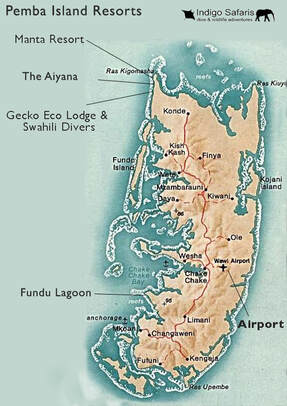PEMBA ISLAND
Much hillier and greener than Zanzibar Island, her sister island to the south, Pemba is the world capital of clove production, and in season the air is heady with the smell of cloves being dried in front of people's homes. This remote and captivating island has often with less than 100 foreign visitors on the island at a given time.
55 kilometres long and 20 kilometres across at its widest point, the majority of the 370,000 inhabitants are subsistence or small-scale cash crop farmers or subsistence fishermen. The island is a very fertile place; besides clove trees, the local crops are mainly coconut, bananas, cassava and red beans, but also mchicha (a sort of spinach), tomatoes, and seasonal tropical fruits, and the deep Pemban waters close offshore provides many game fish.
Belief in witchcraft is widespread on Pemba, and the island was long known as a home of famous and feared witchdoctors and an interesting mixture is still found today. When ill, both hospital and witchdoctor are visited. If one does not work, certainly the other one will! When a death or theft occurs a Pemban will seek both the police and the witch doctor out for advice or action, doubling one's chances of recovery or retribution. If you would like to read more about Pemba's history and culture, please click here.
And despite a plethora of attractions including atmospheric ruins, primeval forest, unique bird species, deserted beaches, and some of the best diving in the Indian Ocean, Pemba hosts less than 100 tourists at any given time, sometimes less than 20 in total in the four resorts.
55 kilometres long and 20 kilometres across at its widest point, the majority of the 370,000 inhabitants are subsistence or small-scale cash crop farmers or subsistence fishermen. The island is a very fertile place; besides clove trees, the local crops are mainly coconut, bananas, cassava and red beans, but also mchicha (a sort of spinach), tomatoes, and seasonal tropical fruits, and the deep Pemban waters close offshore provides many game fish.
Belief in witchcraft is widespread on Pemba, and the island was long known as a home of famous and feared witchdoctors and an interesting mixture is still found today. When ill, both hospital and witchdoctor are visited. If one does not work, certainly the other one will! When a death or theft occurs a Pemban will seek both the police and the witch doctor out for advice or action, doubling one's chances of recovery or retribution. If you would like to read more about Pemba's history and culture, please click here.
And despite a plethora of attractions including atmospheric ruins, primeval forest, unique bird species, deserted beaches, and some of the best diving in the Indian Ocean, Pemba hosts less than 100 tourists at any given time, sometimes less than 20 in total in the four resorts.
|
Accommodation
There are only 4 resorts on the island, 3 in the north and 1 in the south and the 4 together offer everything. There is the basic beach & dive resort Gecko Eco Resort & Swahili Divers, the barefoot luxury resort Fundu Lagoon - our favourite!, The Manta Resort with the underwater room and the high end resort The Aiyana. Click on the map below and have a look where the individual lodges are located. Activities Pemba Island has arguably some of the best wall-diving in the world, certainly the best in Africa for variety and it is equally great for snorkelling. Find out in depth information about the diving & snorkelling here. But there is more to do on Pemba but snorkelling, diving and lying on the beach. Go on an island tour and explore this beautiful tropical island, hire a kayak or stand up paddle board for a mangrove tour, go fishing or maybe on a ngalawa cruise or sandbank excursion. |
Getting to Pemba Island
Flying from Dar-es-Salaam to Stone Town on Unguja (or Zanzibar Island) takes 20 minutes. After a 15-minute break, the 35-minute flight to Pemba yields picture-postcard aerial shots of uninhabited islands and the reefs, before touching down in Chake Chake, Pemba’s biggest town, half-way up the west coast at the end of a long mangrove-lined creek. The airport is a small ramshackle affair.
Leaving the airport with a pre-arranged private transfer, you pass through Chake Chake and its crumbling buildings and stall-filled alleyways, the fruit and vegetable market, and watch the grazing hump-necked cows interrupt an impromptu football match in front of the mosque. Transfers to the north to The Aiyana, Gecko, and Manta Resort, take about an hour by road, transfers to Fundu Lagoon require a 40-minute drive south to the port of Mkoani, and a 15-minute bot ride to Fundu Lagoon's private jetty.
Flying from Dar-es-Salaam to Stone Town on Unguja (or Zanzibar Island) takes 20 minutes. After a 15-minute break, the 35-minute flight to Pemba yields picture-postcard aerial shots of uninhabited islands and the reefs, before touching down in Chake Chake, Pemba’s biggest town, half-way up the west coast at the end of a long mangrove-lined creek. The airport is a small ramshackle affair.
Leaving the airport with a pre-arranged private transfer, you pass through Chake Chake and its crumbling buildings and stall-filled alleyways, the fruit and vegetable market, and watch the grazing hump-necked cows interrupt an impromptu football match in front of the mosque. Transfers to the north to The Aiyana, Gecko, and Manta Resort, take about an hour by road, transfers to Fundu Lagoon require a 40-minute drive south to the port of Mkoani, and a 15-minute bot ride to Fundu Lagoon's private jetty.
where to stay
From our visits to Pemba, we have first-hand knowledge of the resorts. Open, close, then open each tab again to display the images fully.
|
Gecko eco lodge
In the north, under new management since February 2017, the cheapest place to stay and dive.
THE MANTA RESORT
The northernmost resort, the next best priced after Gecko Eco Lodge.
fundu lagoon
To the south of Chake Chake is the luxurious Fundu Lagoon. After a 40-minute transfer to the port of Mkoani, hop aboard a boat for a 10-minute ride to the lodge. The long wooden jetty is impressive, as is the discreet but warm welcome. The rooms are large safari tents under a large thatched roof, with a great en-suite shower room. The sunset views over the infinity pool and across the bay are breath-taking, and the sun setting directly behind the jetty bar and into the ocean surreal.
Rooms All rooms have sea views. THere are 8 hillside rooms, 4 beachfront rooms with your own secluded beach area, 1 beach suite and 1 jungle suite both with a private deck and elevated seating area and small plunge pools, and 4 superior suites with large plunge pools, an open plan lounge, a spacious outside deck area (ideal for private dining), and an elevated lounge, with walkie-talkies for room service. Dining Breakfast comprises a cold buffet and table served cooked-to-order breakfast, lunch is a three-course meal, as is dinner. Lunch is generally taken in the restaurant, but can be served at the pool or at your room or suite. The same goes for dinners, and on Saturdays, dinner is often served on the beach; an eat-till-you-burst gourmet barbecue of slipper lobster, tiger prawns, and calamari washed down with excellent wines. Activities Fundu is just a fantastic place to unwind, either before or after a safari, and can be combined with either a northern or southern Tanzanian safari with "pay 3 stay 4" and "pay 4 stay 7" offers available. The diving around Fundu is superb, the most vibrant coral reefs in Africa are here, from shimmering coral gardens covered with colourful reef fish to groupers patrolling the walls and drop offs in 30m plus visibility. There is a full spa service available on site, excellent game fishing and deep sea fishing, sunset dhow cruises, twice-weekly dolphin excursions, kayaks and windsurfers (though rarely much wind), and visits to the local village, where many of the excellent staff come from, trained in-house. Fundu has a number of completed and ongoing projects that you can visit too. the aiYana resort & spa
Located an hour's drive north of the airport, close to the northwestern tip of the island, nestles The Aiyana, a haven of luxury on a an undeveloped, unspoilt island. Pure and chic, The Aiyana has been designed and built with love by Ashok Sungkur who cut his teeth in the luxury hotel market in Mauritius. The classy architecture, high ceilings, pastel white colours, fragrant gardens, natural forms and traditional African building materials come together perfectly and melt into the natural décor of this little slice of heaven. The Aiyana exudes quality and craftsmanship.
Rooms All rooms have air-conditioning and are spacious, superbly laid out, and very tastefully furnished. Dining Every meal is setup up in a different, private setting each night. We give you the option to decide where you have you meal, it can be either the formal restaurant or the casual beach setting, under the Makuti umbrella or stars, in the organized landscaped bushes, at the white sandy beach or even at the island in front of the hotel to give you the ultimate bliss of having a perfect sunset with drinks and bites. Rates Rates include, bottled water, soft drinks, juices, tea & coffee, cooked breakfast, daily choice of dishes for lunch, afternoon tea and three course dinner. Activities Full service spa, guided walks in the Ngezi Forest Reserve, walks to the lighthouse, snorkelling, fishing. The diving around northern Pemba is superb, the most vibrant coral reefs in Africa are here, from shimmering coral gardens covered with colourful reef fish to groupers patrolling the walls and drop offs in 30m plus visibility. Here the speciality is diving in the passes in Njao and Fundu gaps to the south, and is arranged with Swahili Divers, 15 minutes by boat to the south. |
To see some Pemba itinerary suggestions or request a bespoke itinerary, please click below.




